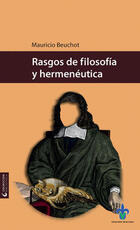
Mauricio Beuchot in Traits of Philosophy and Hermeneutics undertakes the search for a definition of philosophy itself, following its traces in history. He goes on to review Descartes as the great milestone of philosophy that guided the change towards modernity and, later, he will point to Locke, who picked up Descartes' ideal of exactitude from empiricism. Beuchot extends his journey with the idealists, Kant and Hegel, each with a different proposal, and exposes how Peirce constructs a novel synthesis of these two currents of thought. He then reviews some of Heidegger's and Popper's criticisms of metaphysics and addresses Kalinowski's defense against these two philosophers. Beuchot studies the humanism of Buber and Lévinas and continues his analysis with Sartre and Camus, who supported humanism from the line of existentialism focused on the absurd, on the nonsense that they saw as so ...read more






